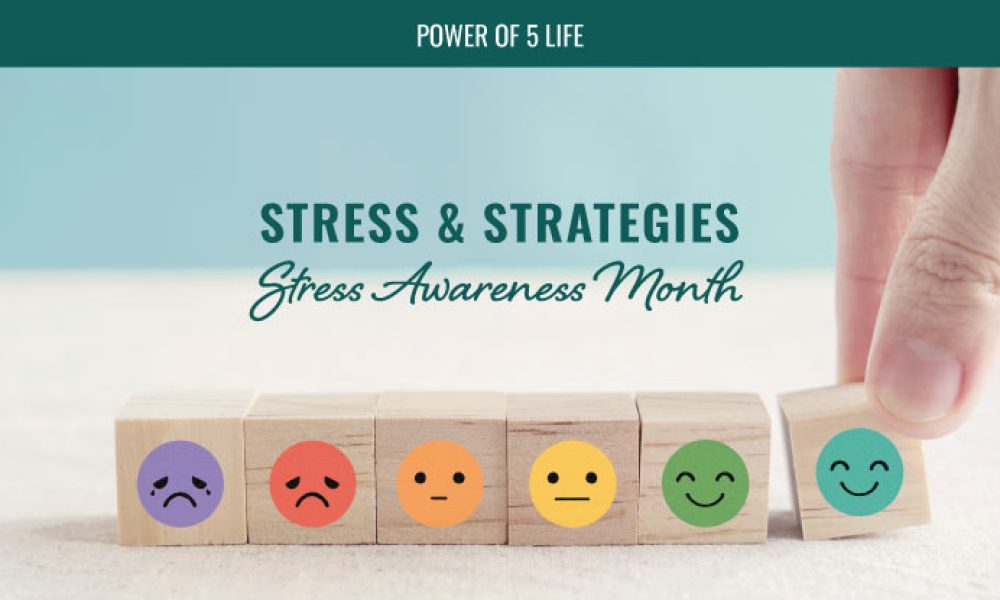Stress & Strategies: Stress Awareness Month
April is Stress Awareness Month, designated in 1992 by the International Stress Management Association as a period to raise awareness about the prevalence, impact, and management of stress.
The purpose for designating April for stress awareness is to:
- Promote understanding of stress and its effects on physical, mental, and emotional well-being
- Encourage open conversation about stress and reduce stigma associated with it
- Provide resources and support for individuals and communities to cope with stress effectively
- Educate the public about stress and its causes
- Highlight stress management techniques and coping strategies
- Provide access to mental health resources and support services
- Encourage individuals to prioritize their well-being and seek help when needed
Is managing stress important? You bet.
Stress is a common and pervasive issue that can have significant consequences for health (which by definition is physical, mental, and social wellbeing) and quality of life. By raising awareness and providing support, Stress Awareness Month aims to empower individuals to manage stress effectively and be healthier.
Stress has been a pervasive condition for as long as I can remember. I experienced it while studying to become a physician and as a doctor providing care to those challenged by life, family events, illness, and death. Addressing the underlying cause and developing coping techniques is an important conversation during stress awareness month.
I also recognize the component that loneliness plays for those who lack support systems to help them with coping mechanisms. In the past decade, who has escaped the impact of the political divide, COVID, the opioid crisis, and financial issues as but another cause of stress in our lives?
Stress Affects Our Health
Through our thoughts, feelings and behavior, stress affects multiple organ systems in a person’s body. I have seen it affect how we eat, sleep and relate to others. Clinical medicine has shown that it contributes to heart disease, high blood pressure, obesity, and deterioration in relationships.
I realize that incivility in our society has led to deterioration and trust that previously might have been a source of comfort and might now be another source of friction. How sad.
I have equivocal feelings about the changes affecting our workforce. While workforce friction might have been eliminated by working remotely, so too has the loss the personal face-to-face support one used to count on when we gathered for lunch or around the “water cooler.”
As we learn to recognize more about stress, here is a list of symptoms to look out for:
Physical Symptoms:
- Headaches and Dizziness
- Muscle Tension or Pain
- Digestive Issues
- Fatigue
- Sleep Disturbances
- Chest Pain or Faster Heartbeat
- Aches and Pains
- Change in Appetite
Behavioral Symptoms:
- Changes in Appetite or Eating Habits
- Sleep Problems
- Using Avoidance Tactics (like procrastination)
- Increased Use of Substances (like drugs or alcohol)
- Withdrawal from Social Activities
- Difficulty Concentrating or Making Decisions
- Forgetfulness
- Habits like Nail Biting or Fidgeting
- Feeling Overwhelmed or Pulled in Too Many Directions
Emotional Symptoms:
Anxiety, Irritability, Sadness or Feeling Overwhelmed, Mood Swings, and Constant Worry
Strategies to Reduce Stress
We can learn to implement strategies to address and reduce stress.
Here are a few basic ideas to help you cope with stress:
Take care of yourself. Eat healthy, exercise regularly, get plenty of sleep … basically my Power of 5 formula.
Take a break if you feel stressed; take a time-out to chill.
Share your problems, how you are feeling and coping with a family member, friend, doctor, or counselor.
Avoid drugs and alcohol. These can create additional problems and increase the stress you are already feeling.
Recognize when you need more help. Knowing that talking to a psychologist, social worker, or counselor is very acceptable, carries less stigma than it did in the past, and can be very effective.
Potentially the most valuable takeaway here is knowing how to talk to others about your stress. This goes both ways, as you need to know how to discuss your problems with others and talk to anyone that comes to you with their issues.
Understand that we don’t all share the same political and social beliefs, but we can learn to avoid those difficult conversations and still maintain friendships.
I have no tolerance for incivility, and it causes me great sadness and stress. I choose to avoid that type of discourse as it is an unpleasant stress in my life. That is one way that I take care of myself.
I encourage my readers to recognize stressful areas in their lives, understand the root cause, and address them to reduce your overall stress as it will lead to better overall health.
I am interested in your thoughts and comments.
To a long and healthy life,
David Bernstein, MD
A human (David Bernstein) generated this blog content with the polishing aid of artificial intelligence.



